FCNNEWSSOURCE

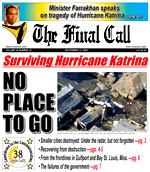
(FinalCall.com) – For many of the thousands of Hurricane Katrina victims who had to gather in the Houston Astrodome to escape the effects of what they thought was “a storm just passing through,” awakened to a different story–their neighborhoods under water from a levee break, with no place to call home anymore. Many evacuees were held on buses for several hours in the parking lot of the stadium, due to initial reports of complaining drivers, and those who were unable to make the journey to the Dome, slept on bridges, or made “help” signs on rooftops, only to have their cries unheard. And with insufficient staff, lack of supplies and broken down air conditioning, the Dome became a living nightmare, likened to a concentration camp.
(FCN Vol. 24, No. 47)
Doing unto the least
On Sept. 3, the Honorable Minister Louis Farrakhan held a press conference at the Omni Hotel in Richmond, Va., during his nationwide tour to promote the objectives and development of the Millions More Movement, wherein he asked all who consider themselves to be Muslims and Christians, to go to the relief centers, adopt a family, bring them to their homes and minister unto them as Jesus would have us to do, and share that bowl of soup with them as Muhammad would have us to do.
(FCN Vol. 24, No. 47)
Racially biased relief
Surrounded by a dark political storm brewing as a result of his slow response to the damaging effects of Hurricane Katrina in the Gulf Coast region, particularly New Orleans, President George W. Bush delivered his weekly radio address Sept. 3 wherein he finally acknowledged the magnitude of the crises, but did not, however, address the deep sense of betrayal felt especially by Blacks and the poor. The response to the catastrophe was considered by one politician a “test of the moral compass” of the United States, which gave a wake-up call to many Blacks to unite and do for self.
(FCN Vol. 24, No. 47)
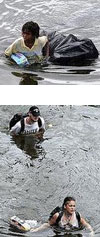
‘Looting’ vs. ‘Surviving’
The charge of racially biased Hurricane Katrina coverage in mainstream media could not have been as far-fetched as some would have liked to consider, providing the fact that two pictures–one of a young Black man wading through chest-deep flood waters with what appears to be items taken from a grocery store, and the other photo involving a White man and woman doing the exact same thing–circulated across the world with two different captions. The caption for the Black man read he was “looting” a grocery store, while the caption for the White people read they were “finding” bread and soda.
(FCN Vol. 24, No. 47)
Under the radar
In a passionate and emotional One on One with The Final Call interview, Vanessa Williams, executive director of the National Conference of Black Mayors, described how she, with her staff of 10, have been working above and beyond the call of her regular duties to facilitate relief efforts to smaller towns and cities destroyed by Hurricane Katrina. Ms. Williams also shared her perspective on the relief concerns from the smaller cities and Black populations that have been overlooked by mainstream media and tragically, federal relief agencies.
(FCN Vol. 24, No. 47)
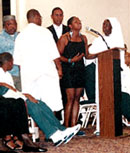
Survivors speak out
On Sept. 11, Minister Farrakhan and a Millions More Movement delegation traveled to areas rampaged by the devastating effects of Hurricane Katrina. In addition to the daylong “whirlwind” tour, he attended a National Town Hall Meeting at the Power Center in Houston, Texas where he, along with the delegation, listened to the painful horror stories survivors were experiencing in this ordeal. He expressed that it was an honor to listen to them, whose stories have inspired him and the delegation, and pledged that the MMM will do everything in its power to ease the suffering of our Brothers and Sisters.
(FCN Vol. 24, No. 48)
From the frontlines
Disturbed by the images of the masses of Black people affected by the tragedies constantly unfolding in New Orleans and the Gulf Coast Region, Attorney Malik Zulu Shabazz, Chairman of the New Black Panther Party (NBPP) and national co-convener of the Millions More Movement, decided to react by traveling to Houston and forming a NBPP Search and Rescue Team. With help from the Nation of Islam, Reverend Al Sharpton and churches, two 50 passenger charter buses were acquired to help save Black people. Despite obstacles made by U.S. military checkpoints, their operation was successful.
(FCN Vol. 24, No. 48)
Not refugees
According to the perspective of Dr. Harry Davidson, Ph.D., the term “refugee” is defined as “one who flees to a foreign country or power to escape danger or persecution,” and did not agree with mass media’s labeling of the survivors of Hurricane Katrina as refugees, unless is was referring to them seeking God’s refuge from the persecution of America.
(FCN Vol. 24, No. 48)
Disaster Relief Call to Action
Responding to the haunting Black faces of suffering in New Orleans and the woefully inadequate government response, a coalition of Black leadership organizations–convened by Minister Farrakhan on the eve of the Millions More Movement mass assembly in Washington, D.C., and including the Congressional Black Caucus, Nation of Islam, Rainbow/PUSH, and a variety of Black professional organizations–held a summit at Howard University Oct. 14 to address the challenges caused and revealed by the storm and its aftermath.
(FCN Vol. 24, No. 49)

Containment Plan
Failure to perform or reluctance to respond by the federal government has left a very substantial foundation to make the case that the government’s actions (or non-action) was perhaps a test run of the notorious King Alfred Plan. The plan, developed by the National Security Council between 1960 and 1964, and executed under the powerful “shadow government” known more popularly as the Federal Emergency Management Agency, is a blueprint to contain, control and manage the entire Black population of America in a limited period of time in case of a massive natural disaster, public disorder, etc. And extermination was not ruled out, if deemed necessary.
(FCN Vol. 24, No. 50)
‘We must rise to help our people’
In the tightly packed sanctuary of New Bethel AME Church on Chicago’s South Side Sept. 24, audience members gathered for a town hall meeting to hear survivors of Hurricane Katrina and listen to the Honorable Minister Louis Farrakhan deliver one of his most passionate addresses, while on tour organizing for the Millions More Movement. Stating that the survivors have “given us a reason to live, organize and maximize our power,” Min. Farrakhan warned us that we will be worthy of death if we do not rise in this hour for the people in Louisiana, Mississippi and Alabama. He also announced the plan for the long-term care of the health, psychological and emotional well-being of the survivors.
(FCN Vol. 25, No. 1)
Kicking them out
The Federal Emergency Management Agency (FEMA) caused a great stir when it announced that it planned to stop paying hotel bills on Dec. 1 for most of the families devastated by hurricanes Katrina and Rita. The announcement had housing officials and community leaders upset that there would not be enough time to find other places for over 50,000 families that will be left homeless. Seeing it as more of a “goal” than a deadline, FEMA stated it wanted the evacuees out of hotels and into travel trailers, mobile homes or apartments until they found permanent homes. It was also announced the plan to end the voucher program March 1, 2006 and send housing aid directly to evacuees who qualify.
(FCN Vol. 25, No. 7)
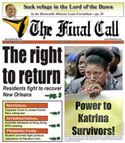
Their right to return
The evacuees of New Orleans have begun forming coalitions to demand their human rights and the right to return to their destroyed neighborhoods. Determined to not be passed around the United States from shelter to shelter, while money continues to flow into rebuilding casinos, hotels, chemical plants and White wealthy districts of New Orleans, many returned to New Orleans during a mass rally at City Hall to protest their treatment. During their return, they were able to tour by bus the wasted areas where they encountered high toxic air pollution, discolored grassland, shifted homes, roofless buildings and debris in the millions of tons piled in the streets, bringing back devastating memories of floating dead bodies for many.
(FCN Vol. 25, No. 11)
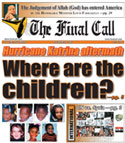
Where are the children?
As of Oct. 25, the number of missing children from hurricanes Katrina and Rita had dropped from nearly 5,000 to 1,676, according to data from the National Center for Missing and Exploited Children (NCME), but that still doesn’t ease the pain for those parents and grandparents, aunts and uncles, searching for their young loved ones. Many are asking, “How is it that no one knows where the children are?,” and this subject was even addressed by the Honorable Minister Louis Farrakhan during the Millions More Movement mass assembly Oct. 15. Another notion could be that these missing children are dead, or possibly in the hands of child predators, as the number of victims of commercial and sexual exploitation is on the rise.
(FCN Vol. 25, No. 4)












